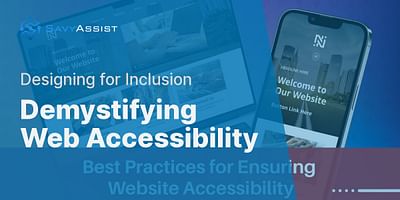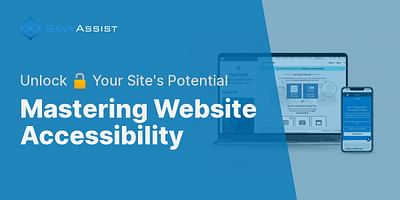Peter is a committed product manager, specializing in the development of technology designed to aid individuals with disabilities. His portfolio boasts a range of projects that leverage AI and machine learning to enhance accessibility. Peter continually seeks innovative methods to make technology more inclusive and accessible.
Making websites and apps accessible is not only the right thing to do, but it also makes good business sense. In today's digital age, where online presence is crucial for success, companies that prioritize accessibility are not only meeting the needs of people with disabilities but also tapping into a large and growing market.
1. Inclusivity and Equal Access: The primary reason for making websites and apps accessible is to ensure that people with disabilities have equal access to information, products, and services. By creating accessible digital platforms, companies can break down barriers and provide an inclusive experience for everyone, regardless of their abilities.
2. Legal Compliance: Accessibility is not just a moral obligation; it is also a legal requirement in many countries. Laws such as the Americans with Disabilities Act (ADA) in the United States and the Equality Act in the United Kingdom mandate that businesses provide equal access to their goods and services, including their digital platforms. Failure to comply with these regulations can result in legal consequences and damage to a company's reputation.
3. Expanding Customer Base: By making websites and apps accessible, companies can tap into a large and underserved market of people with disabilities. According to the World Health Organization, over 1 billion people worldwide have some form of disability. These individuals, along with their friends, family, and caregivers, represent a significant consumer base with purchasing power. By catering to their needs, companies can attract and retain loyal customers, ultimately driving business growth.
4. Enhanced User Experience: Accessibility features not only benefit people with disabilities but also improve the overall user experience for all users. For example, captions and transcripts in videos benefit not only individuals with hearing impairments but also those in noisy environments or non-native speakers. Clear and well-structured content, larger fonts, and color contrast options make it easier for everyone to navigate and understand the information presented.
5. Positive Brand Image and Reputation: Companies that prioritize accessibility demonstrate their commitment to inclusivity and social responsibility. This can enhance their brand image and reputation, leading to increased customer loyalty and positive word-of-mouth recommendations. In contrast, companies that neglect accessibility may face backlash and negative publicity, damaging their reputation and potentially losing customers.
6. SEO Benefits: Accessible websites and apps tend to have better search engine optimization (SEO) performance. Search engines like Google prioritize websites that are accessible and user-friendly, considering factors such as page load speed, mobile responsiveness, and content structure. By optimizing for accessibility, companies can improve their search rankings, drive more organic traffic, and increase their online visibility.
In conclusion, making websites and apps accessible is not only a legal requirement but also a strategic business decision. By prioritizing accessibility, companies can reach a wider audience, enhance the user experience, improve their brand image, and gain a competitive edge in the digital landscape. It's time for companies to recognize the importance of accessibility and invest in creating inclusive digital experiences for all.















